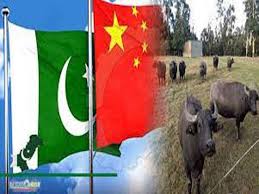Islamabad, September 28 : In a breakthrough for Pakistan’s livestock sector, Royal Cell Biotechnology (RCB), a Chinese company pioneering in buffalo In-Vitro Fertilization (IVF) technology, has successfully obtained 46 embryos from a single Pakistani Nili Ravi buffalo at its state-of-the-art buffalo IVF laboratory in Lahore.
According to Gwadar Pro, this unprecedented achievement was made earlier this month when 132 oocytes were collected from the buffalo, resulting in an embryo production rate of 34.5 percent. Experts say this figure is extraordinary, considering that under normal circumstances only six to seven oocytes are collected per buffalo and the average embryo production rate remains between 20 to 25 percent.
Amna Hafeez, Senior Embryologist at RCB Pakistan, described the success as proof of the elite genetics of the Nili Ravi breed and the effectiveness of the laboratory’s optimized protocols. She emphasized that achieving such a high number of embryos from buffalo is extremely difficult, making this milestone a significant step forward in the field of reproductive biotechnology.
The Nili Ravi buffalo, known internationally as Pakistan’s “Black Gold” for its exceptional milk yield and adaptability, could benefit greatly from such advanced IVF techniques. Experts believe that large-scale embryo production can accelerate genetic preservation, improve herd quality, and increase productivity in the country’s dairy and meat sectors.
This scientific achievement is also expected to support Pakistan’s agricultural development by strengthening livestock resources, boosting farmer incomes, and contributing to the well-being of rural communities. With this development, Pakistan has entered a new era of buffalo breeding, and the collaboration with Chinese expertise highlights the growing importance of China–Pakistan cooperation in agricultural technology.

